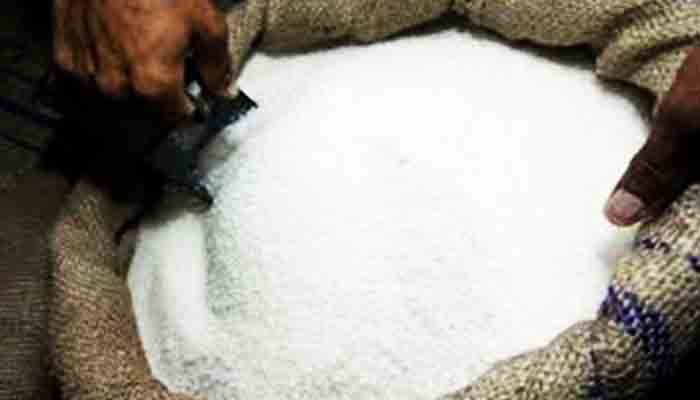Is sugar mafia winning against govt?
The prime minister was threatened that if the Sugar Commission continued to face criminal action against those involved, the country would face the worst sugar crisis
ISLAMABAD: In early 2000, the sugar mafia had threatened Prime Minister Imran Khan as well as the then DG FIA/Chairman of the Inquiry Commission, Wajid Zia, to stop the probe into the sugar scam otherwise the country would see a severe shortage of the commodity and its price could go up to Rs 110 a kilogram. Today, the price of sugar has reached Rs150 per kilogram.
Despite drastic moves -- from the setting up of an inquiry commission to the implementation of its report by different government agencies, from the registration of FIRs against the sugar cartel and arrests -- nothing seems to have has worked for the government that wanted to bring down the price of sugar below Rs 70. The commodity’s price, which was Rs 52 per kg during the previous government’s tenure, is almost three time higher and more than double of what the government had promised.
The prime minister was threatened that if the Sugar Commission continued to face criminal action against those involved, the country would face the worst sugar crisis. The News had reported then that the then DG FIA Wajid Zia, who was heading the Commission, had also been asked to stop the probe otherwise the sugar price would go up to Rs110. The DG FIA had informed the PM’s Office about the threat he had received.
It was claimed by some key government aides that the government's actions were badly hurting the sugar mafia, which was exerting pressure on the government to halt the Commission’s probe. The prime minister’s advisor on interior and accountability, Barrister Shahzad Akbar, personally monitored the actions taken against the sugar mafia but all that the government got as a result was a constant increase in the price of sugar. Press conferences were held, assurances were given, and commitments were made that the government would streamline the system and check the illegal profits of the sugar mafia but everything happened contrary to what the government announced and promised. For quite some time now, Barrister Shahzad is no longer found holding thunderous press conferences.
Under the action plan that was announced by the government in June 2020 to fix the sugar mafia, seven federal and provincial institutions were asked to initiate seven different types of criminal, regulatory and tax-related proceedings against those identified in the sugar commission report.
It was said that politicians owning those sugar mills, whose forensic audit had already been done, would also be questioned by NAB and six other institutions assigned different actions by the government. These politicians include Jehangir Tareen, the Sharifs, the Chaudhry Elahi family, the brother of federal minister Khusro Bakhtyar and Asif Ali Zardari. The approved seven-point action plan involved seven institutions, including NAB, FIA, SECP, FBR, Competition Commission of Pakistan, SBP and the provincial anti-corruption departments.
The action plan that was announced included sending a reference to NAB to investigate the total of over Rs29 billion subsidy allocated and disbursed to the sugar industry by the provincial and federal government over the last five years; the FBR was asked to investigate the income and sales tax related frauds, evasions and benami transactions; the issues related to cartelisation and anti-competitive collusion in the sugar industry were referred to the Competition Commission of Pakistan (CCP) for investigation; the issues relating to export proceeds, loans defaults/ write-offs and sale of pledged stock were sent to the State Bank of Pakistan.
The sugar commission had pointed out the corporate frauds allegedly committed by sugar mills through associated companies. Potential issues of fake export of sugar to Afghanistan and money-laundering came forward during investigations of the inquiry commission and were referred to the FIA. The agency was asked to investigate various federal laws and offences relating to potentially fake exports to Afghanistan and money laundering.
The Sugar Commission had also found sugar millers involved in various offences under provincial laws such as payment to canegrowers below the support price and illegal deductions on account of the weight of cane. The action plan had referred all such potential offences to the Anti-Corruption Establishments (ACE) of Punjab, KP and Sindh provinces for further investigation. However, ultimately, nothing seems to have worked for the people, who are forced today to buy sugar for a massive Rs 150 per kg, and in some cases even more.
-
 'Bridgerton' Season 4: Showrunner Talks About Violet's Steamy Romance
'Bridgerton' Season 4: Showrunner Talks About Violet's Steamy Romance -
 John Tesh Recalls ‘uncomfortable’ Backlash Over ’70s Romance With Oprah Winfrey
John Tesh Recalls ‘uncomfortable’ Backlash Over ’70s Romance With Oprah Winfrey -
 Meghan Markle, Prince Harry Problem Was Not ‘work’ During Time With Royals
Meghan Markle, Prince Harry Problem Was Not ‘work’ During Time With Royals -
 Meta Strikes Multi-billion-dollar AI Chip Deal With Google: Will The New Collaboration Pay Off?
Meta Strikes Multi-billion-dollar AI Chip Deal With Google: Will The New Collaboration Pay Off? -
 Gracie Abrams Breaks Silence After Losing 2026 BRIT Award
Gracie Abrams Breaks Silence After Losing 2026 BRIT Award -
 Deon Cole Takes Swipe At Nicki Minaj In Mock Prayer During NAACP Image Awards Monologue
Deon Cole Takes Swipe At Nicki Minaj In Mock Prayer During NAACP Image Awards Monologue -
 Jennifer Garner Reveals The Actress Who 'carried Through Things'
Jennifer Garner Reveals The Actress Who 'carried Through Things' -
 Shamed Andrew ‘awful’ Time As Trade Envoy Is Laid Bare By Insider
Shamed Andrew ‘awful’ Time As Trade Envoy Is Laid Bare By Insider -
 Belgium Seizes Suspected Russian Shadow Fleet Tanker
Belgium Seizes Suspected Russian Shadow Fleet Tanker -
 Liza Minelli Makes Bombshell Claim About Late Mother Judy Garland’s Struggle With Drugs
Liza Minelli Makes Bombshell Claim About Late Mother Judy Garland’s Struggle With Drugs -
 Shipping Giant Maersk Halts Suez Canal, Bab El-Mandeb Sailings Amid Escalating Conflict
Shipping Giant Maersk Halts Suez Canal, Bab El-Mandeb Sailings Amid Escalating Conflict -
 Matthew McCoughaney Reveals One 'gift' He Achieved With Losing Nearly 50 Pounds
Matthew McCoughaney Reveals One 'gift' He Achieved With Losing Nearly 50 Pounds -
 'Scream 7' Breaks Box Office Record Of Slasher Franchise: 'We Are Grateful'
'Scream 7' Breaks Box Office Record Of Slasher Franchise: 'We Are Grateful' -
 Bolivian Military Plane Crash Death Toll Rises To 20
Bolivian Military Plane Crash Death Toll Rises To 20 -
 'Sinners' Star Blasts Major Media Company For 2026 BAFTAs Incident
'Sinners' Star Blasts Major Media Company For 2026 BAFTAs Incident -
 Inside Scooter Braun, Sydney Sweeney's Plans To Settle Down, Have A Baby
Inside Scooter Braun, Sydney Sweeney's Plans To Settle Down, Have A Baby




